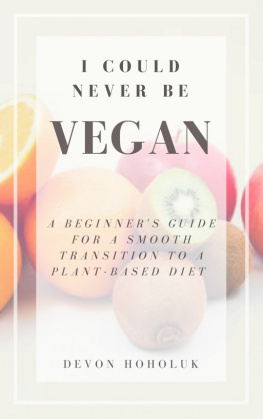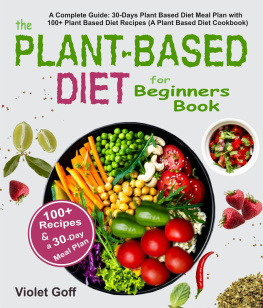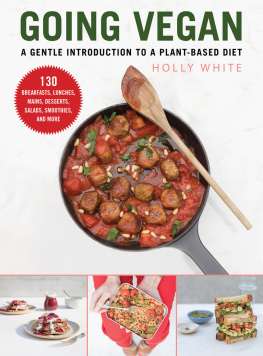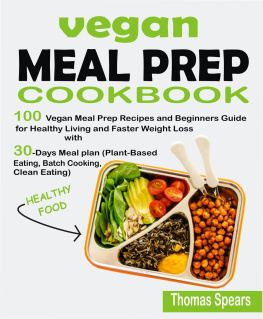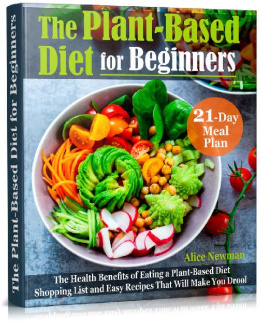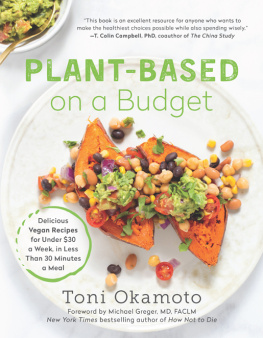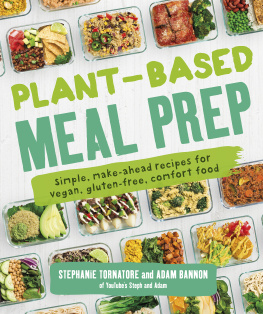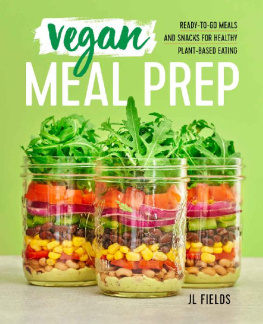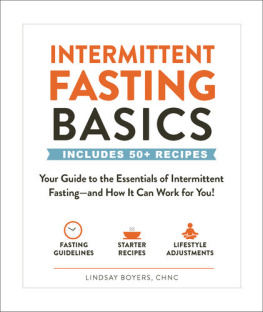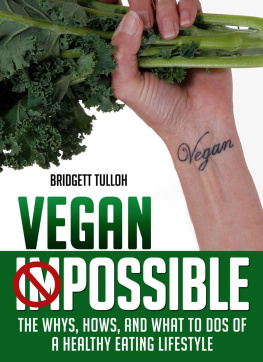I Could Never Be Vegan: A BeginnersGuide for a Smooth Transition to a Plant-Based Diet
Copyright 2013 Devon Hoholuk
Published by Devon Hoholuk atSmashwords
Smashwords Edition LicenseNotes
This ebook is licensed for your personalenjoyment only. This ebook may not be re-sold or given away toother people. If you would like to share this book with anotherperson, please purchase an additional copy for each recipient. Ifyoure reading this book and did not purchase it, or it was notpurchased for your enjoyment only, then please return toSmashwords.com or your favorite retailer and purchase your owncopy. Thank you for respecting the hard work of thisauthor.
Table of Contents
I Could Never Be Vegan:
A beginners guide for a smooth transition to a plant-baseddiet
The wordvegan has been popping up all over the place. The latest dietspromising weight loss are all saying that plants are the way to go;restaurants are offering meat-free options; and people are startingto think that being vegan isnt just for hippies.
Maybeyoure vegetarian, and would like to go a step further and becomevegan. Perhaps some of your friends are vegan, and it seemsinteresting to you, but not necessarily manageable. Or maybe yourea diehard meat eater, and this whole vegan nonsense seemscompletely unreasonable to you, so you chose this book to have somelaughs.
Whatever your stance on veganism is, I hope that by readingthis book you might begin to open your mind to the possibility ofreducing your use of animal products. Im not here to try toconvince anyone that being vegan is the only way to live, or topush my values onto those that dont want to hear them. WhatI am here to dois to give you an introductory view of plant-based diets, and someeasy ways to start to make a change in your life. By definition,vegans not only avoid eating animal products, but boycott the useof animals in their clothing and beauty products as well. While Ipersonally avoid products like leather and wool, and disagree withanimal testing, this book is focused almost exclusively ondiet.
Thisbook is split into four parts:
1.Exploring your Why
2.Exploring you Why Not
3.Veganizing recipes
4.Sample meal plan and resources
Throughout this book, I hope that the readings and shortjournaling exercises will help you to be able to find a version ofthe vegan lifestyle that works for you. I dont expect you to swearoff animal products right away, but maybe youll find somethingthat sparks your interest, or a recipe you might like totry.
My Story
I didntbecome fully vegan overnight. In fact, many people might notconsider me to be fully vegan now. I like to think of veganism as aspectrum; people with their own set of values and beliefs all sitsomewhere on the spectrum, with the intention of reducing as muchharm as possible while still maintaining personal health. Im notsure where I sit really, but one thing Ive learned from being apart of the online vegan community is that there is always somebodymore vegan than me.
As akid, I alternated between being vegetarian and omnivore for years.I was raised to believe that meat was an inevitable and healthypart of life. As an animal lover, my young brain was veryconflicted. My parents, who I trusted to be all-knowing, weretelling me that eating meat was a good thing, necessary for optimalgrowth and health. I was very distraught once I learned that meaton my plate was actually animals that had lost their lives for ourown use. I remember being about eight years old, and declaring thatI was vegetarian. My mom made me a tofu dog that night for dinner,and in those days vegan substitution products were nowhere near asdelicious as they are today. It put me off right away; that wasprobably her intention.
Thison-and-off pattern went on throughout my childhood and adolescence.I maintained a vegetarian diet for a while, but all I really atewas bread, cheese, fruits and vegetables. I didnt yet know how toput together a full meal, and it was tough in my omnivorous familyto have such different views.
As aside note, it is important for me to explain that I have struggledwith eating disorders from a very young age. My relationship withfood and exercise was always problematic. I dont blamevegetarianism in any way for my issues, but I did latch onto therestriction of animal products to help achieve my ill-minded goals.When I started university, anorexia hit me full force. There were ahuge amount of life circumstances that led to the disorderthriving, which arent relevant here. Perhaps Ill write anotherbook discussing the relationship between veganism and eatingdisorders. What is important to note though, is that through mydisorder I researched food to the point of insanity. Nothing wassafe. I wouldnt eat meat, any animal products, gluten, soy, dairy,corn, GMOs, cruciferous vegetables, most fruits, and the list goeson. I barely even drank water for fear of gaining water weight. Iwas seriously ill.
This isrestriction is NOT what it means to be vegan. In fact, veganismdoesnt have to feel restrictive at all! A plant-based diet is achoice, not based on fear. It is replacing cruelty-laden productswith beautiful, colourful, nourishing foods. It is opening yourmind to the possibility that the meat industry isnt completelyhonest in their practices. It is starting to care about theenvironment, sustainability, and conserving the only home wevegot; our Earth.
Throughmy recovery, I have been able to embrace what it means (to me) tobe vegan. I am in a place now where my beliefs and my behaviour canfinally align. I choose foods that nourish my body, and that tastegreat. I am so passionate about sharing my recipes, and playingwith food to make it both beautiful and satisfying. A sample mealplan will be included in the final chapter of this book, whichhopefully will inspire you to get creative with foodyourself.
I knowthat sticking to a plant-based diet is a lifelong choice for me. Iwill never go back to consuming meat products, or supporting thedairy and egg industries. I no longer buy leather, wool, or silk.However, my version of veganism is probably not as strict as some.Ive learned that not everything is black or white, all or nothing;I simply do everything I can to live a life that Im proud of,while also maintaining my own well-being. What really helped me toswitch from an eating disorder-skewed version of veganism to ahealthy sustainable lifestyle was figuring out my Why, or reasonsfor wanting to explore a vegan lifestyle. In the next chapter, Iwill help you to discover your own reasons for testing out what itmeans to be vegan.
Writing Exercise:
What is my first thought when I hear the wordvegan?
What do I know about veganism?
Take some time to think or journal about thesequestions.
Chapter One: Explore your Why
So, whyare you vegan?
I getasked this question almost daily. Its a question I know the answerto, and yet have a very hard time wording my response.
Exploring your own reasons for being vegan can be quite theproject, but it can also be a useful tool for sticking to thelifestyle. Ive known quite a few people who have heard aboutveganism as a sort of trendy fad that theyve decided to try.Thats fine, great actually, because that opens the door forfurther exploration of what it means to be vegan. However, thismight not be the most sustainable Why when it comes to stickingwith veganism long term. Ive also heard people using veganism as ameans to lose weight. While weight loss is certainly possible andoften does occur in new vegans, its not a sure thing at all. Thisdiet mentality, I believe, is setting people up for failure. Theterm diet brings with it the idea of an end; you follow the diet,lose the weight, and then resume regular life.
This iswhy I describe being vegan as a lifestyle, rather than a diet. Imnot saying that being strictly a dietary vegan is a bad thing. Ifhealth is one of your main reasons for testing out veganism, great!Id just like to point out that health and weight loss are not onein the same. To add to that, veganism is about more than just food.Animal products are found in the clothes we wear, the products weuse, and more. But food is often the first step for those decidingto explore veganism, and thats awesome. No matter where you decideto start making changes, you are making a difference in theworld.
Next page
